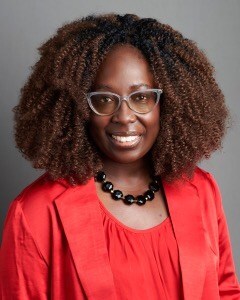Some might think it impossible to land an article in the New England Journal of Medicine. After all, only 5% of research submissions are accepted each year, and that's worldwide. Dr. Sylvia Owusu-Ansah's article in the most recent edition, "Reviving Hearts - Uniting Communities with Lifesaving Bystander CPR," places her among the 5%. Yet there's more to the story that sets Dr. Owusu-Ansah apart: She took CPR training to Black communities and university athletes, populations predisposed to sudden heart failure. She also brought health communications expert Patricia Green Rodgers, who co-authored the article, on board, feeling Patricia's community engagement and media relations expertise could support her work.
LITTLESTOWN, Pa., June 20, 2024 /PRNewswire-PRWeb/ -- As early as childhood, Dr. Sylvia Owusu-Ansah, Associate Professor of Pediatrics and Emergency Medicine at the University of Pittsburgh School of Medicine; EMS Medical Director, UPMC Children's Hospital of Pittsburgh, and Associate Vice Chair of Diversity, Equity, and Inclusion, Department of Pediatrics, persevered and ignored the doubters. Some might think it impossible to land an article in the New England Journal of Medicine. After all, only 5% of research submissions are accepted each year, and that's worldwide. Dr. Owusu-Ansah's article in the most recent edition, "Reviving Hearts - Uniting Communities with Lifesaving Bystander CPR," places her among the 5%. Yet there's more to the story that sets Dr. Owusu-Ansah apart: She took CPR training to Black communities and university athletes, populations predisposed to sudden heart failure. She also brought health communications expert Patricia Green Rodgers, who co-authored the article, on board, feeling Patricia's community engagement and media relations expertise could support her work. Link to the article at
Dr. Owusu-Ansah's name is ubiquitous in Pittsburgh and beyond. Much of the buzz began during COVID-19. She was the first physician in Pennsylvania and one of the first physicians in the country to get vaccinated against the life-threatening disease. "Our community was being hit the hardest," said Dr. Owusu-Ansah. "Death rates in the Black community were higher than any others. If we didn't do anything, meaning getting vaccinated, the virus would eliminate us," she said during the crisis.
An online search finds other examples of why her colleagues, partners, local, state, and national, as well as the general public, call Dr. Owusu-Ansah The Community Doctor. "Blacks are less likely to receive CPR than whites, which accounts for higher death statistics. I go into communities where Blacks and other at-risk populations live and teach them preventative health care, including CPR before they end up in the ER for a medical emergency. I train middle schoolers, giving them a head start on preventative health care, and they, in turn, train family members. Frankly, I feel our Black students are usually forgotten or left out of the equation of life. They deserve our focus and attention, as they are our future. For many of these students, social determinants of health lead to the odds stacked against them, especially when considering health outcomes. The missing factor is that these children are beautiful, talented, eager to learn, and world changers. It is our job to provide them opportunities to thrive," she concludes.
University of Pittsburgh athletes also participate in Dr. Owusu-Ansah's CPR training. "Athletes are driven, disciplined, and committed role models. They play a significant role in driving societal change. Yet, sudden cardiac arrest is one of the leading causes of death for students who are athletes. One assumption is that sudden cardiac arrest is the same as a heart attack," Dr. Owusu-Ansah adds. UCHealth cites the difference: "A heart attack happens when blood is blocked to the part of the heart, causing heart muscle tissue to fail or die. Sudden cardiac arrest means the heart stops pumping. Heart attacks can, however, trigger electrical malfunctioning that brings about sudden cardiac arrest." Says Dr. Owusu-Ansah: "By teaching athletes lifesaving skills, they are empowered to take charge of their destiny or the destiny of others. Pittsburgh native and NFL star Damar Hamlin inspired the movement. A former Pitt athlete, now with the Buffalo Bills, he suffered cardiac arrest and collapsed on an NFL field, received CPR on the field, and survived after being in critical condition for nearly a week. I engage celebrity athletes by being sincere about my mission: to help our children to help themselves," Dr. Owusu-Ansah concludes.
It takes a village. Collaborations and strategic partnerships are instrumental in Dr. Owusu-Ansah's local, state, and national reach. The local chapter of the American Heart Association and state and federal entities offer her a platform critical to health policies and system change. Her duality of medicine and public health degrees provide a pathway to educate on health priorities throughout life. The nonprofit organization she co-founded, Akoma United, plans a mission trip to Ghana this fall to train medical professionals on their CPR model. Patricia Green Rodgers integrates public relations and community engagement to support partnership building and media exposure.
Carving a differentiator makes for good storytelling. Dr. Owusu-Ansah has a unique story to share, rooted in passion, purpose, medical excellence, and an unwavering commitment to community work beyond the walls of hospitals. Her unique story was captured in her short film, In Good Hands, which is now being entered into film festivals. It is no wonder that the New England Journal of Medicine felt Dr. Owusu-Ansah's submission newsworthy. For more information and interviews, contact Patricia Green Rodgers at 301-526-1089 or [email protected].
Media Contact
Patricia Green, MSW, MSPR, The Patricia Green Group, 301-526-1089, [email protected], patriciagreengroup.com
Dr. Sylvia Owusu-Ansah, Akoma United, 301-437-5773, [email protected], akomaunited.com
SOURCE How One Doctor Does It and Saves Lives



Share this article